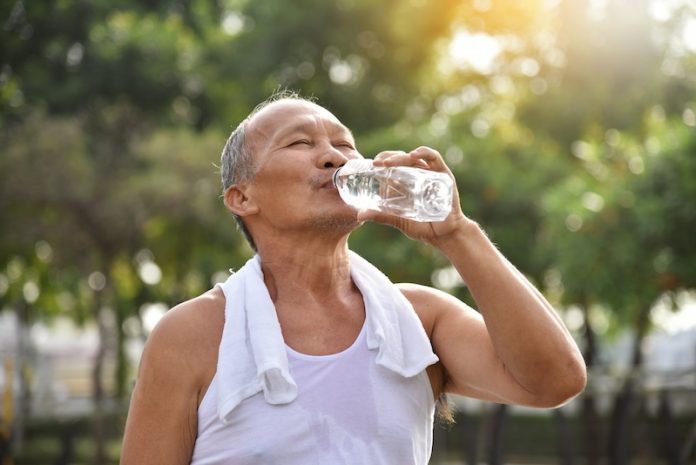
Water is essential for every function in the body, and staying hydrated is especially important for older adults. Dehydration, which occurs when the body doesn’t have enough water to function properly, can cause serious health problems.
Among these, the impact on heart health is particularly concerning. Research shows that dehydration can strain the heart, increase the risk of cardiovascular issues, and make existing heart conditions worse.
As people age, the risk of dehydration increases for several reasons. Older adults tend to have a reduced sense of thirst, meaning they may not feel the need to drink water even when their bodies require it.
Medications, such as diuretics or laxatives, can also lead to fluid loss. Additionally, changes in kidney function can make it harder to conserve water. Together, these factors make it easier for dehydration to develop and harder to recover from.
Dehydration affects the heart by thickening the blood. When the body loses too much water, the blood becomes more concentrated, making it harder for the heart to pump. This increases heart rate and can lead to higher blood pressure.
A 2019 study published in The Journal of Clinical Hypertension found that dehydration was linked to spikes in blood pressure, especially in older adults. Over time, these added stresses on the heart can increase the risk of cardiovascular problems, including heart attacks and strokes.
Another concern is that dehydration reduces blood volume, which can cause the body’s tissues and organs, including the heart, to receive less oxygen. This can lead to dizziness, weakness, or fainting, particularly in older adults with pre-existing heart conditions.
A 2021 study in The American Journal of Cardiology found that dehydration significantly increased the risk of complications in older adults with heart failure, as their already weakened hearts struggled to cope with reduced blood flow.
Dehydration can also disrupt the balance of electrolytes in the body, such as potassium and sodium, which are essential for proper heart function. Electrolyte imbalances can lead to irregular heartbeats, also known as arrhythmias.
A study in The European Heart Journal in 2020 highlighted that older adults who were dehydrated were more likely to experience arrhythmias, which can be life-threatening if not addressed.
Preventing dehydration is a simple yet powerful way to support heart health. Drinking enough water throughout the day is key, but hydration needs can vary depending on activity levels, medications, and overall health.
A general guideline for older adults is to aim for about 8–10 cups of water daily, though individual needs may differ. Foods with high water content, such as fruits, vegetables, and soups, can also contribute to hydration.
Recognizing the signs of dehydration is equally important. Symptoms like dry mouth, dark urine, dizziness, or fatigue can indicate the need for more fluids. For older adults with heart conditions, staying alert to these signs can help prevent complications. Regular check-ups with a healthcare provider can also help monitor hydration and electrolyte levels.
In conclusion, dehydration is a significant risk factor for heart health in older adults. By thickening the blood, reducing oxygen delivery, and disrupting electrolytes, dehydration places extra stress on the heart and increases the risk of cardiovascular problems.
Staying hydrated is a simple but vital step in protecting heart health and maintaining overall well-being. With proper hydration and awareness, older adults can reduce their risk of heart-related complications and support a healthier life.
If you care about heart disease, please read studies that herbal supplements could harm your heart rhythm, and how eating eggs can help reduce heart disease risk.
For more health information, please see recent studies that apple juice could benefit your heart health, and results showing yogurt may help lower the death risks in heart disease.
Copyright © 2025 Knowridge Science Report. All rights reserved.



